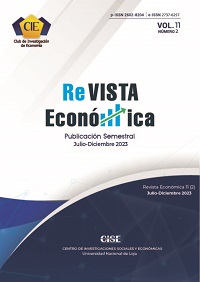Stagflation: Yesterday and today
Main Article Content
Abstract
Article Details

This work is licensed under a Creative Commons Attribution-NonCommercial-NoDerivatives 4.0 International License.
Esta obra está sujeta a la licencia Reconocimiento-NoComercial-SinObraDerivada 4.0 Internacional de Creative
Commons. Para ver una copia de esta licencia, visite http://creativecommons.org/licenses/by-nc-nd/4.0/.
References
Fisher, Irving (1997). “The theory of interest”; Pickering & Chatto.
Galbraith, James (2019). “Modern Monetary Realism”; en: https//www.projectsyndicate.org; el 15 de marzo.
Jeannot, Fernando (2020 a). “La síntesis institucional” en: Fernando Jeannot (coordinador y autor); “Estancamiento y recuperación: once años después”; Universidad Autónoma Metropolitana.
Jeannot, Fernando (2020 b). “La competitividad imperfecta en el umbral del coronavirus”; revista Contribuciones a la Economía; abril; en: https://www.eumed.net/rev/ce/2020/2/competitividad-imperfecta-coronavirus.html.
Jeannot, Fernando (2016). “La innovación social en Commons”, en revista Análisis Económico n° 76, primer cuatrimestre; en: http://www.analisiseconomico.azc.uam.mx.
List, Federico (1979). “Sistema nacional de economía política”; Fondo de Cultura Económica.
North, Douglass (2005). “Understanding the Process of Economic Change”; Princeton. DOI: https://doi.org/10.1515/9781400829484
OCDE (2020). “Perspectivas de la economía mundial”; en http://www.oecd.org/perspectivas-economicas/; el 16 de septiembre.
Ostrom, Elinor (2009). “El gobierno de los bienes comunes” Fondo de Cultura Económica.
Oxfam (2021). “Los milmillonarios del mundo poseen más riquezas que 4.600 millones de personas”; en: https://www.oxfam.org/es/notas-prensa/los-milmillonarios; el 25 de enero.
Roubini, Nouriel (2020). “Revisiting the White Swans of 2020”; en: https//www.projectsyndicate.org; el 29 de julio.
Roubini, Nouriel (2021a). “Is stagflation coming?”; en: https//www.projectsyndicate.org; el 14 de abril.
Roubini, Nouriel (2021b). “Goldilocks Is Dying” en: https//www.projectsyndicate.org; el 21 de septiembre.
Tullock, Gordon (2005). “The rent seeking society”, Liberty Found. DOI: https://doi.org/10.4337/9781845424688.00012
Veblen, Thorstein (1898). “Why is Economics Not an Evolutionary Science”; The Quarterly Journal of Economics; en: http://economistsview.typepad.com/economistsview/2009/06/; el 1 de noviembre 2021.

